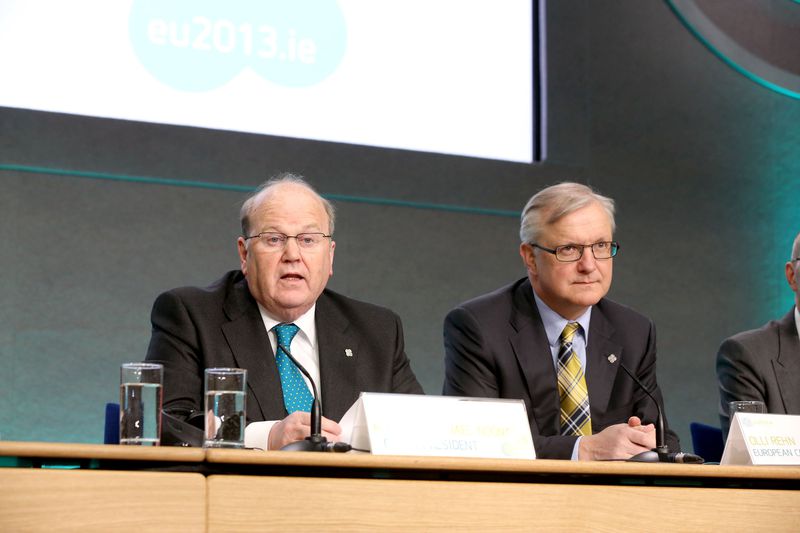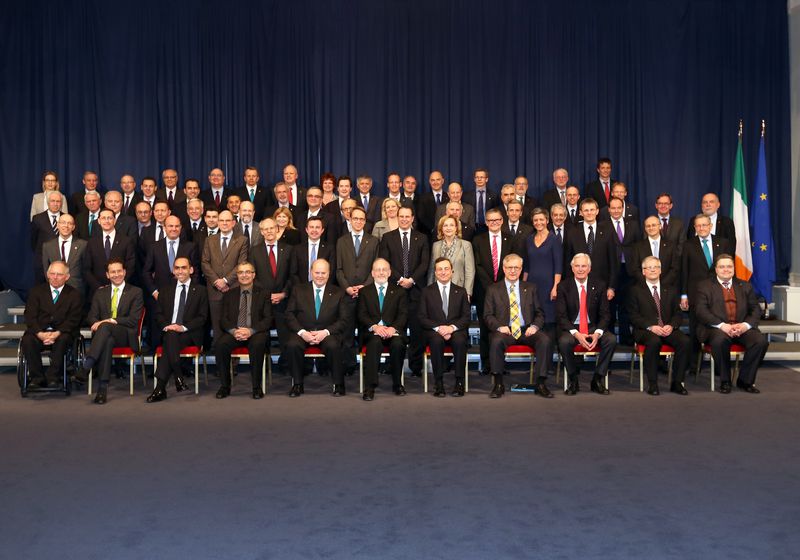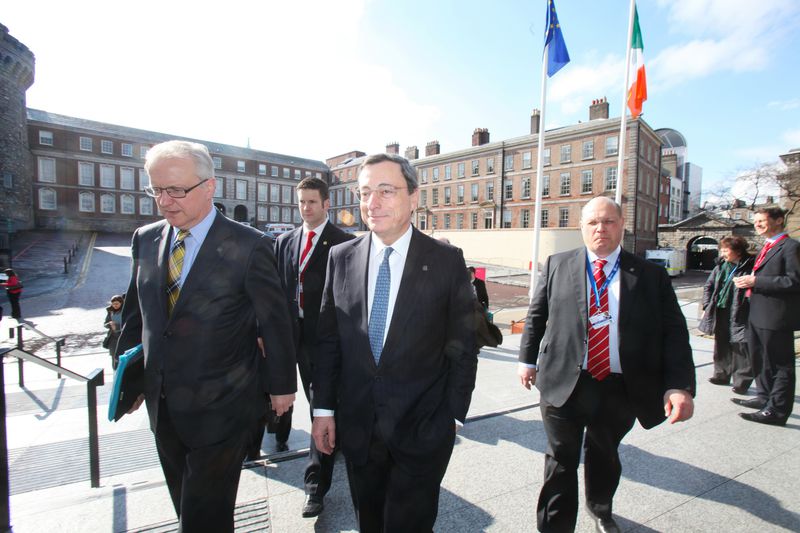Ireland Is Preparing To Exit Bailout Yet This Year, Portugal Conceals Problems
Adelina Marini, April 18, 2013
 Until the crisis in Cyprus, the situation in the euro area seemed under control and although everyone are aware that a long and difficult path lies ahead, after all the sun is shining and the end of the continuous debt winter is on the horizon. The situation with the Cypriot bailout, expected for a long time, did not deteriorate remarkably the recovery perspectives of the eurozone from the worst crisis since the creation of the single currency, but it revealed some problems with the very construction of the Economic and Monetary Union (EMU), especially in terms of decision-making, criteria on the basis of which decisions are taken, and communication. The Cypriot crisis was the first big test for the new chief of the Eurogroup, Jeroen Dijsselbloem, who made several communication gaffes which still reverberate throughout the EU.
Until the crisis in Cyprus, the situation in the euro area seemed under control and although everyone are aware that a long and difficult path lies ahead, after all the sun is shining and the end of the continuous debt winter is on the horizon. The situation with the Cypriot bailout, expected for a long time, did not deteriorate remarkably the recovery perspectives of the eurozone from the worst crisis since the creation of the single currency, but it revealed some problems with the very construction of the Economic and Monetary Union (EMU), especially in terms of decision-making, criteria on the basis of which decisions are taken, and communication. The Cypriot crisis was the first big test for the new chief of the Eurogroup, Jeroen Dijsselbloem, who made several communication gaffes which still reverberate throughout the EU.
In the end of the day, the situation was brought under control, the Cypriot programme is almost ready and the final details are being hammered out. Somewhere in the middle of the process, however, new tremors appeared, but on the other end of the European Union - Portugal. It is the third eurozone country that had to be bailed out in the peak of the crisis in 2011, but the first where a complete consensus among the main political parties was reached for the needed reforms accompanying the 78 billion euros assistance. This was a key achievement and one of the first lessons the Commission learnt and currently the former prime minister of Portugal and now European Commission President Jose Manuel Barroso recalls on many occasions (the last time he did it was during his meeting with the new premier of Slovenia, Alenka Bratusek) - that without broad national consensus the implementation of any reforms is difficult and exposes to risks not only the troubled country, but its partners too.
Portugal - Nordic reforms momentum, southern peripheral implementation
On April 5th, it seemed that the Portuguese national consensus had started to crack after the Constitutional court rejected the cabinet's proposal for additional budgetary cuts. You probably think that the respectable judges decided the Portuguese citizens had enough of the severe conditions imposed by the omnipotent troika. But the truth is that the Constitutional judges voted to suspend, though temporarily, their 13th and 14th salaries. In economy we call this conflict of interest, wrote in a commentary for the Centre for European Political Studies (CEPS) Leonor Coutinho. It's important to note that she is a senior researcher in European studies and a special scientist with the University of Cyprus.
Leonor Coutinho recalls that those same judges did not reject the "extraordinary solidarity contribution" which imposes progressive cuts of pensions above 1,350 euros. The court then justified its decision that after all it was a temporary measure which is "justified by a situation of economic and financial distress". Hitherto, the researcher notes, the suspension of the Christmas benefits of the Constitutional judges is also a temporary measure and should, too, be justified from the point of view of financial distress.
Portugal has problems with the meeting the set in the adjustment programme budget deficit targets. According to the 7th quarterly review of the programme by the troika, which ended in March, the recovery is round the corner and yet in the end of this year it can be expected the recession to end and the Portugal's economy to start growing. Last year, the real gross domestic product shrank by 3.2 per cent. Shrinking by 2.3% is expected this year too, but next year 0.6% growth is forecast. Unemployment, however, is expected to peak at 18%. And as, after all, the government has restored a large part of the lost trust and is already demonstrating successful return on the international debt markets, Lisbon requested a review of the budget deficit targets.
In 2013, Portugal had to reduce its budget deficit to 4.5% of GDP, but the government wants the target to be 5.5% and insetad of 2.5% next year to be allowed a 4% deficit with the argument that in this way the automatic fiscal stabilisers will be left to deliver. The expected return within the norm below 3% is expected in 2015. The troika agrees with this argument and believes that if the new targets are accompanied by targeted consolidation efforts, they should be respected. And although the public debt is expected to peak at 124% of GDP, it remains sustainable, is the opinion of the troika. All this sounds very optimistic if only it was not for the Constitutional court's resistance, especially for something which definitely causes indignation from Nicosia to Helsinki, through Berlin and Brussels.
Leonor Coutinho writes that the government of Portugal has to save expenditure amounting to 1.3 billion euros which is not much, but most of the options are exhausted. What is left is to cut from health care, social benefits, education and state-owned companies. Another option is further reduction of public employees in a combination with an increase of the working hours per week in the public sector, which currently are 35 hours and is one of the lowest workloads.
A third option is extension of maturities of the loans provided by the troika lenders - EU, IMF and ECB. And it was this option that was quickly approved by the financial ministers of the EU during their informal meeting in Dublin last weekend. Before the meeting, Jose Manuel Barroso said it was very important to reach an agreement because confidence must be maintained in Portugal's efforts to put its finances back in order. After all, everything that could help Portugal return and remain in the international markets for credit is welcomed by the Commission and the Council to avoid further shaking of the already fragile recovery in the eurozone.
If it was not for Ireland
It is not very certain whether such benevolence to Portugal would have been possible if it was not for Ireland which is preparing yet this year to leave the adjustment programme and to start doing on its own as before. The Irish, since the very beginning when they were forced to ask a bailout, invested enormous efforts to limit their spending and return to growth, but were constantly stumbled by the other problems in the euro area. Ireland is also currently holding the Council rotating presidency and pushes very actively the construction of the banking union to continue. What Ireland needs the most is the supervisory mechanism for the banks to be approved as fast as possible, which happened at the Dublin  meeting, so that work can begin on ensuring the necessary tools for the eurozone permanent bailout fund to be able to lend money for direct recapitalisation of troubled banks.
meeting, so that work can begin on ensuring the necessary tools for the eurozone permanent bailout fund to be able to lend money for direct recapitalisation of troubled banks.
Dublin strongly hopes that an element of retroactivity will be allowed for those tools, which will help Ireland take out from its public balance the huge debt it piled to save its troubled banks - Bank of Ireland and Anglo Irish Bank. This could have a remarkable effect on the country's financial health, but for now there is no unanimity on this issue. Another very important element in Ireland's return plans to the group of "the normals" is also extension of maturities for loans.
The troika proposed several options for extension
Before the beginning of the meeting in Dublin, in the public domain leaked the working document of the troika, from which it becomes clear that the extension of the maturities on the two bailouts will play the role of an important catalyst for the full recovery of market access, thus allowing Ireland and Portugal to fund themselves, switching off the life supporting systems of the troika. The two countries requested an extension of 15 years, but the troika calculated that a 7-year extension would be more appropriate. According to the Irish debt management office, the country will need some 20 billion euros for refinance in the period 2016-2020 which is 12% of the 2013 GDP of the country. Investors value the country's commitment for fiscal consolidation and for increase of competitiveness, but they still deem that the financial systems is not capable of supporting a durable recovery of the real economy.
The share of bad loans is still high on banks' balance sheets, which is another reason for concern for the market participants. The Moody's credit rating agency points out that a possible extension could have an impact on investors to change their minds.
Portugal's case is very similar - the excessively high public debt generates huge refinancing needs in the next years. It is expected next year the public debt to reach its highest level of 124% of gross domestic product as half of it is mid-term and long-term debt which is owned by the private sector and the ECB, and one third is loans under the programme. In Portugal, the maturities of the mid-term bonds, the fiscal deficits and the payments of the official loans are expected to generate also around 20 billion euros refinancing needs in the period 2015-2021 which is also 12% of the Portuguese GDP.
And although the market access of the two countries has been restored to some extent, there are still difficulties. The problem with Portugal gets additionally complicated by the fact that a large part of the interest to Portuguese bonds on the secondary markets comes from hedge funds and specialised asset managers, meaning speculative capital, instead of the traditional institutional investors that dominated in the past.
 The troika offered four options for extension: 2.5, 5, 7 and 10 years. All these options have flaws, but the 7-year extension is pointed as the most balanced between Portugal's interests and the interests of the lenders. The troika's recommendation was approved relatively quickly by the Eurogroup which gathered in Dublin for a meeting on Friday morning. Later the deal was sealed by the non-euro finance ministers as well, whose word was important because they have a contribution to the permanent bailout fund of the eurozone.
The troika offered four options for extension: 2.5, 5, 7 and 10 years. All these options have flaws, but the 7-year extension is pointed as the most balanced between Portugal's interests and the interests of the lenders. The troika's recommendation was approved relatively quickly by the Eurogroup which gathered in Dublin for a meeting on Friday morning. Later the deal was sealed by the non-euro finance ministers as well, whose word was important because they have a contribution to the permanent bailout fund of the eurozone.
After the agreement was reached, European Commission Vice President Olli Rehn welcomed it and said that Ireland was again a normal country known for its very green fields. In the joint statement the Eurogroup and Ecofin hope that the extension will not only restore access to gathering own funding, but will also restore confidence of market participants, thus shielding Portugal and Ireland from the troubles in the other programme countries mentioning explicitly Cyprus.
The decision for the extension was taken very fast and without much trouble, which once again shows how desperately EU needs serenity at the moment. It is important, however, to keep vigilance because if, in the case of Ireland, there are no reasons for concern, the reasons that made Portugal's Constitutional court to reject the proposed measures to reduce spending show that this country could create problems in the future, especially if the forecast about the economic growth do not come true.
 Klaus Regling | © Council of the EU
Klaus Regling | © Council of the EU Mario Centeno | © Council of the EU
Mario Centeno | © Council of the EU Mario Centeno | © Council of the EU
Mario Centeno | © Council of the EU